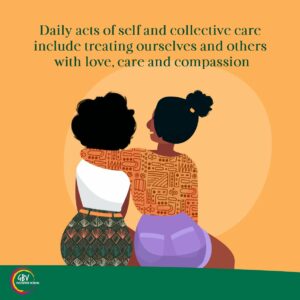“We are each other’s harvest: we are each other’s business: we are each other’s magnitude and bond.” Gwendolyn Brooks.
Collective care has always been central to our existences as Africans before we were so selfishly robbed of our identities by colonialism and capitalism through all their manifestations. At the core of our being, and more so as African women, was the ability to show up and hold space for one another, share resources and create joy within our community. I most certainly delight in the fact that this practice was not just out of scarcity or necessity like it is in our current times, but rather, it is how our ancestors lived and co-existed in society.
Watching Judge Kentaji Brown Jackson, an African American attorney and jurist nominated for the United States Supreme Court, go through the insufferable vetting process from the most ignorant racist and bigoted white men, many things are so apparent yet again. That black women, whatever talent they have are expected to remain at the bottom of the food chain because the system was designed that way and an attempt at dismantling it comes with so much trauma and abuse as evidenced in the questioning from the senate judiciary committee.
And like Toni Morrison reminds us, “in the absence of so many support systems, we are it for each other…” We are all we have got and indeed collective care is in and of itself an act of radical resistance. I draw great inspiration from my mother, Gwiza, who practices radical collective care in ways I am yet to learn. I do not recall a single day that went by without her extending care to an ailing neighbor, a neighbor’s child or opening the door to a tired traveler.
Our home was open to everyone (also because it was not gated, so naturally, it was open to all). Most especially women moving from village to village doing church ministry. School-going children. A traveler passing through. She made sure of it that there was always something to eat or drink for anyone that set foot in our home. Our home was not just a merry-go-round stop-over. It was a place for communal healing and a place to find joy.

I now know that the women who came for sleepovers in the middle of the night, between murmurs and whispers and sobs, were victims of domestic violence. In her power, my mother mediated marriages, resolved conflicts, fought against domestic violence, and made her home something close to a sanctuary for collective healing. My mother made everyone’s business her business and maybe we should too if we are to flourish in a society that has been structured against us.
The work we do as feminists, activists and organizers takes a huge toll on our mental and physical health. We are in constant interaction with violations and injustice, of our own and those whose freedoms we are fighting for. Dismantling such violent systems that are set to hurt us and beat us into resignation demands that we prioritize intentional collective care and wellbeing if we are to carry on this important work that we do. We must also be conscious of the ways in which self-care has been commodified by capitalism, neoliberalism and the rising hyper-individualistic culture. We have to collectively resist the idea of viewing self-care as a solution to systemic oppression and hate.
At the height of the pandemic in 2020, celebrities and wealthy individuals lounging in their 5-acre homes told the rest of the world to self-isolate and practice self-care as a way to get through the pandemic while most people in the world died from hunger and lack of access to health care. While it is true that we need to individually care for ourselves, self-care does not exist in a vacuum. Without a healthy, caring, and loving community that is organizing together to pull resources, hold space for individual and collective healing, it is impossible for one to sustain individual care in a toxic environment.
Perhaps our mothers knew then what we are learning now, that the systems were not designed to protect us. Our mothers created community and practiced collective care as an act of survival but also as a place to radically reimagine the futures of their children.
They formed saccos “ebigombe” (collectives) where they pooled savings that would later be our education insurance from which they would draw to pay for our school fees and have access to money for health care among other needs. Our mothers would later learn that, as African women, to experience joy is amidst fellow women who do not view you as a tool for productivity and through their saccos, they would celebrate each other, provide for their families, travel to visit a sick sister in a faraway land and buy something nice for each other as a way of saying, ‘we survived and lived through it all’.
For African women, our lives exist at the intersections of patriarchy, racism, capitalism, sexism, transphobia and all socially constructed isms and phobias, we must continue to draw lessons from how our ancestors built strong community care for survival and reimagine new ways in which we can incorporate and practice intentional collective care in our work and daily activism.
Mugabekazi (Gloria) Mugasha is an African feminist working towards liberation through intersectional feminist organizing, currently works with Akina Mama wa Afrika, a Pan-African Feminist organization. She tweets @TheMugasha
